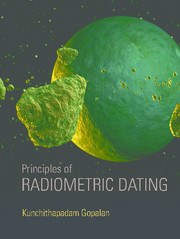Book contents
- Frontmatter
- Dedication
- Contents
- Preface
- Acknowledgments
- 1 Basics
- 2 Nuclear Transformations
- 3 Nucleosynthesis
- 4 Isotopics
- 5 Radioactivity and Radiometric Dating
- 6 Mass Spectrometry and Isotope Geochemistry
- 7 Error Analysis
- 8 Meteorites: Link between Cosmo- and Geochemistry
- 9 Chronology of Meteorite History
- 10 Chemical Evolution of the Earth
- 11 Chronology of Earth History
- References
- Index
7 - Error Analysis
Published online by Cambridge University Press: 21 October 2017
- Frontmatter
- Dedication
- Contents
- Preface
- Acknowledgments
- 1 Basics
- 2 Nuclear Transformations
- 3 Nucleosynthesis
- 4 Isotopics
- 5 Radioactivity and Radiometric Dating
- 6 Mass Spectrometry and Isotope Geochemistry
- 7 Error Analysis
- 8 Meteorites: Link between Cosmo- and Geochemistry
- 9 Chronology of Meteorite History
- 10 Chemical Evolution of the Earth
- 11 Chronology of Earth History
- References
- Index
Summary
The uncertainty of a date is as important as the date itself.
K LudwigINTRODUCTION
The calculation of a radiometric age (strictly speaking, radioactive decay interval) of a natural object is ultimately based on the decrease in the concentration of a parent isotope in that object during the interval. The measurement of the initial and final concentrations (directly or otherwise) in terms of an internationally accepted unit (moles per unit weight of the sample) is always subject to analytical errors or uncertainties. These analytical errors will be reflected (propagated) in the final age result. In this chapter we will consider generally accepted methods of estimating analytical error in a measured quantity, and how it will affect the final result based on this measurement (Cunningham, 1981).
The absolute error in a measurement is the discrepancy between the measured value and its ‘true’ value. Except in the case of counting discrete objects, a measurement of a physical quantity in terms of an internationally-accepted unit will always be subject to an uncertainty. The true value that we are seeking is unknowable, unless it is already known in some other way. So, it is necessary to state from the results within what range of values the true value is likely to occur and the confidence that can be placed on the validity of this statement. The statement of a result without any indication, with a certain confidence, of the range of values bracketing the true value has virtually no significance to end users. The idea of errors is, therefore, not something of only secondary or peripheral interest in an experiment. On the contrary, it is related to the purpose of the experiment, the method of doing it and the relevance of the results to a significant scientific question. The quotation in the beginning of this chapter reflects the importance of error limits to an experimentally measured date or age.
SYSTEMATIC AND RANDOM ERRORS
Before proceeding further on error estimates, we must distinguish between two types of experimental errors—determinate or systematic, and indeterminate or random. Determinate errors generally shift the measured result in one direction with respect to the true value. They are often reproducible, and, in many cases, may be measured, and or corrected for by careful and meticulous experimentation.
- Type
- Chapter
- Information
- Principles of Radiometric Dating , pp. 96 - 109Publisher: Cambridge University PressPrint publication year: 2017



